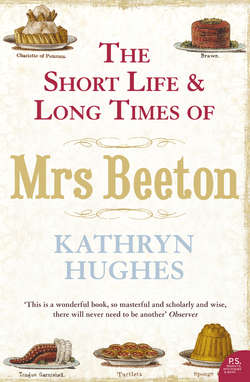Читать книгу The Short Life and Long Times of Mrs Beeton - Kathryn Hughes - Страница 10
INTERLUDE
ОглавлениеCherishing, then, in her breast the respected utterances of the good and the great, let the mistress of every house rise to the responsibility of its management.
ISABELLA BEETON, Book of Household Management
EVERYONE IN MRS BEETON’s imaginary household is rising, moving upwards, heading somewhere. The servants are busy working their way through the ranks (if there are no chances of promotion where they are, says Beeton, they will shift sideways to a smarter household). The mistress, meanwhile, isn’t simply getting up early for the sake of it, but in order to manage her household more efficiently, keeping a hawk-eye out for wasted time or money. Embedded in Beeton’s text is the assumption that this household is an aspirational one, busy edging itself into a style of living that currently lies just out of reach.
In order to achieve that lifestyle – an extra housemaid, a second footman – the income of the household will need to rise too, and Mrs Beeton thoughtfully provides a table showing what each jump of £200 or so will give you. So although the head of the household remains mainly off stage in the Book of Household Management, his economic efforts remain absolutely crucial to the whole enterprise. He, too, is busy improving his position in the workplace so that his wife can run a better-staffed home, and his servants can in turn push for promotion.
Since everyone in Beeton’s household is busy helping themselves (in all senses) it is a nice coincidence that 1859, the year that the Book of Household Management first started appearing in parts, is also the year that Samuel Smiles published his iconic Self-Help. These days more referred to than read, Self-Help consists of thirteen chapters with stirring titles such as ‘Application and Perseverance’ and ‘Energy and Courage’ in which lower-middle-class men are urged to emulate the educational and social trajectories of such titans as Robert Peel, James Watt, or Josiah Wedgwood. The message of Smiles’ book, repeated over and over again as if in an attempt at self-hypnosis, is that in the new industrial age pedigree and birth no longer make a gentleman. What matters now are thrift, hard work, and temperance. Properly pursued – and perseverance is everything here – these qualities won’t simply make you pleasant, civilized and cultured, they will also make you rich: ‘energy enables a man to force his way through irksome drudgery and dry details, and carries him onward and upward in every station in life’. Rich enough, in fact, to afford the cook, upper housemaid, nursemaid, under-housemaid and manservant that Mrs Beeton envisages for the household whose income is ‘About £1,000 a year’.
But Self-Help and Beeton’s Book of Household Management are bound together by more than a shared publication date and a driving concern with social advancement. The Smiles family happened to be very good friends of the Dorlings. Although Samuel Smiles was a Scotsman who had worked as both a doctor and a newspaper editor in Leeds, by 1854 he was settled in Blackheath where he was employed as a railway executive, writing his books on the side. The two families were initially intimate in south London where both households were known for their generous hospitality. This intimacy continued after Henry and Elizabeth Dorling’s deaths in the early 1870s when six of the unmarried Dorling and Mayson girls moved to Kensington, just around the corner from where the Smiles were now living in style in Pembroke Gardens. In April 1874 Lucy Dorling, the little half-sister who had always been closest to Isabella, walked up the aisle with Willy Smiles, Samuel Smiles’ second eldest son.
And there the story might have ended, with the neat coming together of the two families that between them produced the founding texts of mid-Victorian social aspiration. But there is a final, chilling coda, which suggests just what happened when Self-Help and Household Management blended a little too enthusiastically. Lucy and the tyrannical Willy, who ran the Belfast Rope Works, produced eleven children. The story goes that in order to encourage early rising, perseverance and so on in his brood, Willy insisted that every morning there would be only ten boiled eggs provided for the children’s breakfast. The last one down, the slugabed, went hungry.
